Chapter 13
Special Days
Most people look forward to special days or holidays. Most days are ordinary days
in which we
carry on the commonplace duties of life. Some days are special days that have
a particular meaning. We observe these special days in various ways.
What are some of your favorite special days? What special days do you look forward to?
Do you have a favorite holiday? Why?
The children of Israel also had certain very special days which they were to observe.
In Leviticus chapter 23, verses 4-44 we learn about seven special days (although some
lasted for more than one day) which are called "the _____________ of the
_________" (Leviticus 23:4). The first of these was THE PASSOVER and the last of
these was THE FEAST OF TABERNACLES.
1. Special days have an appointed time.
What day of the year do we celebrate Christmas? ___________________________ Do we
always celebrate it on this day? ______ We would never think of having Christmas
in the middle of
the summer when it is 90 degrees hot. In what month do we always observe Thanksgiving?
___________________When do you observe your birthday? ___________________________
Is it always observed at the same time every year? We all
know when the Fourth of July is celebrated. This is also called Independence Day. Special days take place at
appointed times during the year and they are usually printed on calendars so that people
will know exactly when these holidays will take place.
Likewise, the children of Israel knew exactly when their holy days were to take place.
For example, what was the appointed time for the PASSOVER (Leviticus 23:5)? ________________________________________________________ The only problem is that the children of
Israel had a different calendar system than the one we use today. When we think of the
first month, what month do we think of? _____________________ But
when the Jews thought of the first month, they thought of Nisan. The Jewish months were
different. The twelve Jewish months were as follows:
| 1. Nisan |
(March-April |
| 2. Iyar |
(April-May) |
| 3. Sivan |
(May-June) |
| 4. Tammuz |
(June-July) |
| 5. Ab |
(July-August) |
| 6. Elul |
(August-September) |
| 7. Tishri |
(September-October) |
| 8. Marchesvan |
(October-November) |
| 9. Chislev |
(November-December) |
| 10. Tebeth |
(December-January) |
| 11. Shebat |
(January-February) |
| 12. Adar |
(February-March) |
As you can see, Nisan was the first month, Tishri was the seventh month and
Adar was the
twelfth month. On our Calendar, the important holidays (special days) that we observe fall
on the following months:
| January |
New Year’s Day |
| February |
Lincoln’s Birthday
Washington’s Birthday
(President's Day) |
| March |
|
|
Good Friday/Easter (sometimes in March; sometimes in
April) |
| April |
|
| May |
Motherís Day
Memorial Day |
| June |
Flag Day
Fatherís Day |
| July |
Independence Day (4th of July) |
| August |
|
| September |
Labor Day |
| October |
Columbus Day |
| November |
Veteran’s Day
Thanksgiving |
| December |
Christmas
Hanukkah |
On the Jewish Calendar, the important feasts and holy days and special days fall on the
following months:
| Nisan |
The Passover
The Feast of Unleavened Bread
The Feast of First Fruits |
| Iyar |
(Independence Day) |
| Sivan |
The Feast of Pentecost |
| Tammuz |
|
| Ab |
|
| Elul |
|
| Tishri |
The Feast of Trumpets
(Rosh Hashanah/New Year)
The Day of Atonement
The Feast of Tabernacles |
| Marchesvan |
|
| Chislev |
Hanukkah |
| Tebeth |
|
| Shebat |
|
| Adar |
Purim |
2. Special days are established either by men or by God.
The many holidays that we observe today were established by men, not by God. It was
our national leaders who decided that our country should observe Thanksgiving Day every
November. (Most other countries do not observe Thanksgiving Day.) It was men who decided to
celebrate Christmas and who chose the date (December 25). In the Bible, God never tells us
to observe this day. Believers are told to remember Christ’s death often by the
observance of Communion (1 Cor. 11:23-25) but believers are never told to remember
Christ’s birth (although certainly God wants us to ponder the great truths found in
Matthew 1 and Luke 1-2, such as the incarnation, the virgin birth, etc.).
Thinking about Christ's incarnation and the reason He came into the world can be
very edifying, but God never
commanded us to celebrate Christmas.
The holidays or holy days observed by the children of Israel were not man-made. God
Himself established these special days and commanded His people to observe them (see
Leviticus chapter 23, especially verses 2 and 4). Moses did not originate the idea to
have these special days. The idea came from the mind and heart of God.
3. Special days have important meaning.
There is meaning and significance behind most holidays. It is more than just eating
a special meal or seeing relatives or not having to go to school. Special days have special meaning.
What meaning do the following days have to you?
CHRISTMAS
INDEPENDENCE DAY
(Fourth of July) |
EASTER
THANKSGIVING
|
The Jewish special days also had meaning which we will consider later in this chapter.
The problem comes when a special day loses its meaning. People celebrate the day and do
this and that, but they often do not really know why they are doing it. The true meaning
of the holiday is not understood or appreciated by them. Sadly, this is true for many at
Christmas time. People are all excited about the holiday (the lights, the shopping, the
gifts, the trees, Santa, etc.) but they don’t really understand the Christ of
Christmas, nor do they understand why He was born.
The same was true of many of the Jewish holy days. These days soon lost their meaning.
The Jews even failed to observe some of these days even though God commanded them to do
this. For example, from the days of Joshua down to the time of Nehemiah, the feast of
tabernacles had never once been celebrated (see Nehemiah 8:17).
4. Special days are useful in teaching children.
Children are always interested in special days. They see the Christmas trees and lights
and gifts and they get all excited. Such times can be good teaching opportunities. One
parent used Christmas sights as an opportunity to teach the following:
- When you see Christmas trees you should remember that the Lord Jesus died on a tree (1
Peter 2:24). He was born to die.
- When you see Christmas lights you should remember that Jesus Christ is the Light of the
world (John 8:12).
- When you see Christmas gifts, you should remember that the greatest gift of all is the
gift of God’s Son (John 3:16). God is the great GIVER of Christmas! (not Santa!)
For the children of Israel, the Passover time of the year was always a good time for
the parents to teach the children about how God brought them out of the land of Egypt by His powerful Hand (see Exodus 13:8,14). Children are always filled
with many questions, especially on special days when special activities take place. If
parents can supply the right answers then the holiday can become a wonderful time of
learning.
5. Special days are occasions to REMEMBER.
Many holidays should stir the mind and cause us to remember certain things that
sometimes we tend to forget. In our country we have a special REMEMBRANCE holiday called
MEMORIAL DAY. What should we remember on this day? Is this something that we tend to
forget or take for granted? What should Thanksgiving Day remind us of or make us think
about (see Psalm 103:2)? What should INDEPENDENCE DAY remind you of?
The children of Israel had special days to remind them about some special
things that God had done for them. For example, what day were they never to
forget (Exodus 13:3)?
____________________________________________________________________ The
Passover was observed each year to help them remember this.
6. Special days often involve traveling.
Many people travel at Christmas time or at Thanksgiving time. Many go to be with
relatives. Children and parents and grandparents are often brought together under the same
roof. Did you travel anywhere last Christmas? Did you travel anywhere last Thanksgiving?
The children of Israel would often travel all the way to the city of Jerusalem for some
of the important feast days (especially the Passover, the Feast of Pentecost and the
Feast
of Tabernacles). They wanted to be where the temple was. This is why there were so many
people in Jerusalem the week that Christ was put to death on the cross. It was the
Passover time and thousands of pilgrims and visitors came to this city (Josephus says
there were 2,700,000 people in the city at Passover time). Also in Acts chapter 2 we learn
that there were Jews from every nation under heaven who had gathered together at Jerusalem
for the feast of Pentecost (Acts 2:1,5).
7. Special days sometime point to the future.
Some holidays should make us think about what is going to take place in the future. For
example, when we think about Christmas we usually think about the first coming of Christ
when the Saviour came to this earth and was born in Bethlehem. However, Christmas should
also point to the future and remind us that there is also a second coming of Christ. Ethel
Miller thought about this when she wrote the following poem about Christmas:
He Is Coming Again
The birth of the Saviour is something we know;
The Bible describes it, we believe it is so.
The people around us give evidence, too.
That they know the story, believe it is true.
By the first of November, decorations are sold;
By Thanksgiving Day the idea is old.
They sing all the carols and trim up the trees,
They set up the mangers and fall on their knees.
The children, though looking for Santa and fun,
Are sometimes informed about God’s only Son.
And sometimes amid the mad shopping race
The cross of the Saviour is given a place.
Yes, the world has a Christmas of color and show
But, say, are they missing what they ought to know?
Has mankind forgotten the things Jesus said
About the world’s future and what lies ahead?
His coming again is in the Book, too;
The Bible describes it, we know it is true.
The stable and manger were only the start;
In the world of salvation they are the first part.
The cross and the grave and the rising again
Are part of the scheme for redeeming lost man.
But even with these there still is a lack;
The plan’s not complete ‘till Jesus comes back.
Are you telling your friends as Christmas draws near
That this day may not be the best of the year?
Before that day dawns there may be a shout
And those who love Jesus will be taken out.
What sorrow for many! What joy for the few
Who go up to heaven to start life anew!
Remember at Christmas, the Saviour of men
Has promised His own HE IS COMING AGAIN!
-By Ethel Miller
|
The seven feasts of the LORD (Leviticus 23) pointed ahead to the future in a very
special way. Remember, all of these feasts were established by God and originated with
Him. All of these seven feasts point ahead to the Lord Jesus Christ and what He would
accomplish for man. The feasts were "shadows" (compare Hebrews 10:1) but the
"substance" (the real thing that the shadows pointed to) was Christ. The shadow
of an ice cream cone tells you that there is a real ice cream cone somewhere. What would
you rather eat--the shadow of a cone or a real ice cream cone? The real thing is what we
want! May God help us to understand the future (prophetic) significance of the seven
feasts of the Lord:
THE SEVEN FEASTS OF THE LORD
Leviticus chapter 23
1) THE PASSOVER (Leviticus 23:4-5)
Are you familiar with the Passover story? The key verse is found in Exodus 12:13--"when I see the _____________ I will _______ __________
you."
God’s final plague of judgment against the Egyptians was the death of the
first-born. The Passover lamb was slain. The blood of the Passover lamb was applied to the
door post (Exodus 12:7). When God came that night on His mission of death, what did He do
when He saw the BLOOD on the door of the house (Exodus 12:13,23)? __________________________________________ When He did not see the blood, what did He do? _______________________________________
All of this pictures the great work which Christ did on the cross for us. The following
diagrams may help:
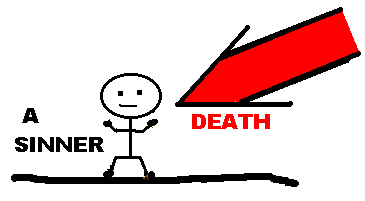 |
THE SINNER DESERVES DEATH!
Romans 6:23
Romans 1:32
Ezekiel 18:4 |
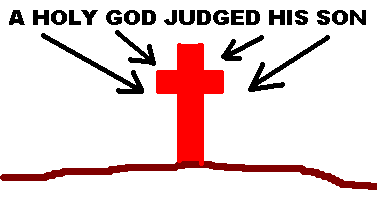 |
THE PASSOVER LAMB IS SLAIN
1 Corinthians 5:7
John 1:29 |
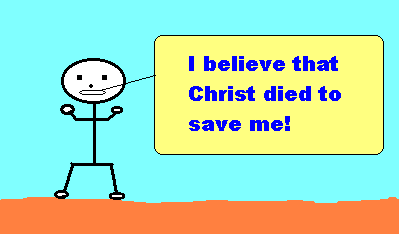 |
THE BLOOD OF THE LAMB is personally applied to the heart's door BY
FAITH
Romans 3:25
Acts 16:31 |
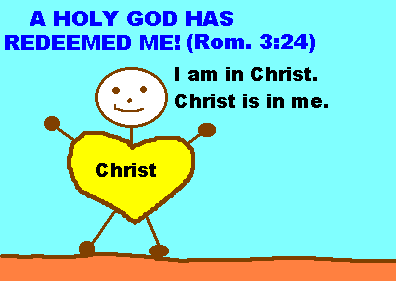 |
GOD WILL NOT JUDGE the person
who has personally applied the blood of Christ
John 5:24
Romans 8:1 |
Thus the Passover feast not only looked back to the great work that God did in Egypt,
but it also looked ahead to the great work of REDEMPTION accomplished by Jesus Christ when
He shed His blood on the cross!
2) THE FEAST OF UNLEAVENED BREAD (Leviticus 23:6-8)
Following REDEMPTION (The Passover) the believer is to have a HOLY WALK in fellowship
with a HOLY GOD (see 1 Peter 1:15-16). "Leaven" in the Bible is a symbol of the
corrupting influence of evil and sin. Thus the absence of leaven would point to holiness
and purity of life (see 1 Corinthians 5:8). After a person goes through the door of
redemption he finds himself on the path of holiness. "But now being made free from
_______
(redemption), and become servants to God, ye have your fruit unto __________________ and the end
everlasting life" (Romans 6:22).
3) THE FEAST OF FIRST FRUITS (Leviticus 23:9-14)
This was a special day to celebrate the harvest. The children of Israel were to bring a
sheaf of the first fruits of their harvest to be waved before the Lord with thanksgiving.
The first fruits brought this message of hope and encouragement: "THERE’S MORE
TO COME!" When you pick your first tomato from your garden you might think,
"This is the first tomato, but THERE ARE MORE TO COME!"
This feast pointed ahead to the RESURRECTION OF JESUS CHRIST. Notice that the sheaf was
waved on the day after the Sabbath. The Jewish Sabbath was the seventh day of the week
(Saturday), and so the day after the Sabbath would have been the first day of the week or
S__________________ This is the day that Christ rose again from the dead (Mark 16:9).
In the resurrection chapter of the Bible (1 Corinthians 15) we have a description of
the great resurrection harvest: "But every man in his own order: Christ the
__________________, afterward they that are Christ’s at His coming" (1
Cor. 15:23). Christ’s resurrection brought this message of hope and encouragement:
"THERE’S MORE TO COME!" Because He lives, we shall live also!
4) THE FEAST OF WEEKS OR PENTECOST (Leviticus 23:15-22)
The Feast of Weeks was a harvest feast also known as
Pentecost (which means
"fiftieth day"). It took place fifty days after the offering of the first fruits
(seven weeks later). This feast also took place on a Sunday (Lev. 23:16).
What happened seven weeks after the resurrection of Christ? The answer is found in Acts
2:1--"And when the ______ of ___________________ was fully come." It was
on this day that the Holy Spirit came to dwell with believers in a very special way and
the CHURCH was born. Notice that with the wave sheaf (FEAST OF FIRST FRUITS) no leaven was
offered, for there was no sin or evil in Christ. However, the wave loaves (FEAST OF PENTECOST)
which pointed to the CHURCH were "baked with leaven" because the presence of sin
and evil is still found in the CHURCH (Lev. 23:17 and compare Romans 7:17,20,21).
5) THE FEAST OF TRUMPETS (Leviticus 23:23-25)
This feast took place in the seventh month of the Jewish calendar. Trumpets were blown
in Israel for different reasons: 1) to sound an alarm; 2) to prepare the people for battle;
3) to call the people together for an assembly (meeting).
When the Lord Jesus Christ returns, the trumpet will sound to call God’s people
together. First, Jesus Christ will come for His church. This is called the RAPTURE. The
Bible teaches that when this happens "the trumpet will sound" (see 1 Thess. 4:16
and 1 Cor. 15:52). Secondly, Jesus Christ will return to earth to be Israel’s Messiah
and King. At this time the trumpet will again sound and the Jewish people will be regathered and brought together (see Matthew 24:31).
6) THE DAY OF ATONEMENT (Leviticus 23:26-32)
This day was so important that the Bible devotes an entire chapter to it (SEE LEVITICUS
CHAPTER 16). The New Testament clearly explains to us how the Day of Atonement pointed to
Jesus Christ and the work which He did on the cross (see Hebrews chapter 9). In Leviticus
chapter 23 the Day of Atonement is presented as a day of sorrow and repentance (note the
word "afflict" in Leviticus 23:27,29,32).
The nation Israel rejected the atonement provided by Jesus Christ (John 1:11). However,
a future day is coming when the nation Israel will mourn and repent and recognize that
Jesus Christ, the One who was crucified, is the true and only Saviour of men (See
ZECHARIAH 12:10-14). At that time a great FOUNTAIN of cleansing will be opened unto the
Jewish people (Zechariah 13:1) and "all Israel will be saved" (Romans
11:26-27). Thus the day is coming when this nation will recognize Jesus Christ as their
only hope for atonement and salvation. May God help us to recognize and receive Christ as
our personal Saviour TODAY.
7) THE FEAST OF TABERNACLES (Leviticus 23:33-44)
The feast of sorrow (DAY OF ATONEMENT) was followed by the feast of gladness
(TABERNACLES). What word in Leviticus 23:40 tells us that the feast of tabernacles was a
feast of gladness? ______________ In the days of Nehemiah when this feast was
finally celebrated, after so many years of not observing it, there was "very great
_________________" (Nehemiah 8:17).
The feast of tabernacles looked back and it looked forward. It looked back to the
great
work of redemption which God had done in Egypt (Lev. 23:43). It also looked ahead to the
glorious kingdom of Christ which every Jew looked forward to. When Christ is King on
earth, the Jews and people from every nation will celebrate the feast of tabernacles every
year (Zechariah 14:16).
All seven of the feasts of the LORD can be summarized on the following chart:
THE FEASTS OF
THE LORD (see Leviticus 23)
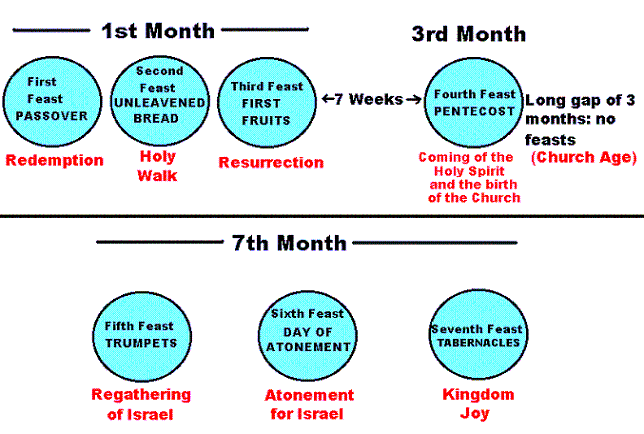
Other Jewish Special Days
- YOM KIPPUR--this is the Hebrew way of saying "DAY OF ATONEMENT."
- PURIM. This is the feast of Esther mentioned in Esther 9:27-28. This special day is still
observed by Jewish people. This is a very happy day for the Jewish people as they remember
the wonderful way in which God delivered the Jews in the days of Esther. In Jewish
synagogues the book of Esther is read during this holiday. Do you remember
Haman’s
wicked plot to destroy all of the Jews throughout the world? How did God work things out
so that His people were delivered? This special day should remind us that the Jewish
people are indestructible. God has a wonderful plan for the Jewish people and this plan
will be fulfilled. No Haman or Hitler or Antichrist or anyone else will prevent God from keeping His
promises to the nation Israel.
- ROSH HASHANAH–this is the Hebrew way of saying, "NEW YEAR" and it is
observed on the first day of the Seventh month (Tishri).
- MAY 14, 1948. Just as July 4, 1776 is very important to Americans, so May 14, 1948 is a
very special day for Jewish people to remember, because this was the day when the modern
nation of Israel was established in the Middle East.
- HANUKKAH. This is another happy, festive day for the Jewish people (usually it occurs
close to Christmas time). This holiday (which lasts for eight days) commemorates the
Jewish victory over the Syrians and Greeks in 186 B.C. (the period of history that falls
between the Old and New Testaments). At this time the Jewish hero, Judas Maccabaeus, with a
small army of soldiers, victoriously entered Jerusalem. He cleansed, repaired and
rededicated the Temple. The "feast of dedication" mentioned in John 10:22 is a
reference to Hanukkah. It has also been called the "feast of lights."
Birthdays and The Bible
Usually when we think of special days we think of our birthday. The Bible mentions
birthdays in only two places, and in each place the birthday celebration resulted
in a
man’s death. In Genesis 40:20-22 Pharaoh’s birthday was observed and the chief
baker was put to death. In Matthew 14:6-12 we learn that Herod had a birthday party and it
was on this occasion that John the Baptist lost his head.
This can be a reminder to us that our birthday demands a death day. We were all born
in
sin and sin demands death! Only those who are BORN AGAIN can claim the promise of eternal
life. Thus we have the "revised" words to the birthday song:
HAPPY BIRTHDAY TO YOU! JUST ONE WILL NOT DO!
BORN AGAIN MEANS SALVATION! HOW MANY HAVE YOU?
or
HAPPY BIRTHDAY TO YOU! JUST ONE WILL NOT DO!
TAKE CHRIST AS YOUR SAVIOUR, AND THEN YOU'LL HAVE TWO!
A Special Day Each Week!
The children of Israel were to observe a special day every week. They were to
"REMEMBER THE _______________ DAY, to keep it holy." (Exodus 20:8)
What day of the week was the Sabbath day? What were the Jews to do on this day (or what
were they not to do)? What were they to remember and think about on this day?
Believers in Christ (church age believers) also have a very special day each week. What
day is this? Why do Christians worship on this day and not some other day?
Note: For a detailed study on the Sabbath and the Lord's day, see
the following document:
The Sabbath and The Lord's Day.
Back to BIBLE TIME & CUSTOMS
Back to SUNDAY SCHOOL MATERIALS & HELPFUL BIBLE
STUDIES
Home Page




